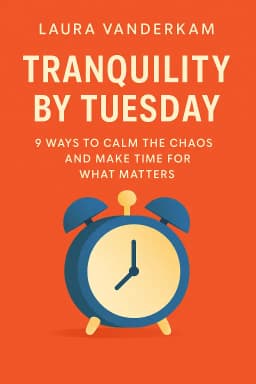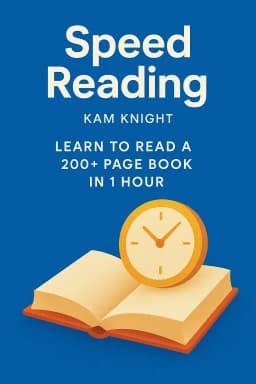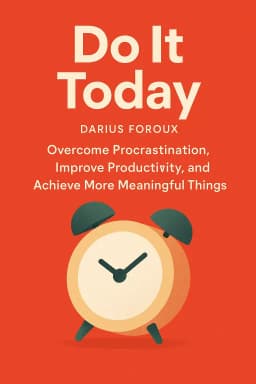
The Willpower Trap
Golden Hook & Introduction
SECTION
Mark: A single hour spent clearing your inbox can drain your brain's decision-making power so much that it measurably sabotages your performance on your next important task. That's not a feeling; it's a biological fact. We're fighting a battle for focus with the wrong weapons. Michelle: Wow. That explains my entire afternoon, every single day. I always feel like I've run a marathon after an hour of email, and then I can't even string a sentence together for the actual work I'm supposed to do. Mark: You've just perfectly described the problem. And that's the central premise of a fascinating book we're diving into today: Two Awesome Hours by Josh Davis. Michelle: Right, and what's so interesting about Davis is his background. He's not just another productivity guru; he has a PhD in neuroscience from Columbia and is an expert in exercise science. He comes at this from a purely biological, 'how does the human machine actually work?' perspective. Mark: Exactly. He argues we've been treating our brains like computers, focusing on 'efficiency,' when we should be treating them like the biological organs they are, focusing on 'effectiveness.' And that shift in thinking changes everything. Michelle: I’m intrigued. Because 'hustle culture' has been telling us for years to just power through, to be more disciplined, to fight distractions. Where do we go so wrong with that approach?
The Willpower Fallacy: Why 'Trying Harder' Is the Worst Strategy
SECTION
Mark: We go wrong by assuming the weapon is willpower. Davis argues that mental energy, specifically what neuroscientists call our 'executive functions'—the part of our brain that plans, decides, and resists temptation—is a finite resource. It's like a muscle. You can exhaust it. Michelle: Okay, but can it really be exhausted by something as simple as email? That seems a bit extreme. Mark: It does, but the science is clear. Every email, no matter how trivial, forces a micro-decision. "Should I reply now? Later? Delete it? Archive it? What's the right tone?" Each one is a small rep that fatigues the muscle. Davis tells this incredible, and slightly painful, story about a marketing director named Tom. Michelle: Oh, I love a good painful story. Let's hear it. Mark: Tom was brilliant. He had this amazing idea to revive a classic product line for his company. The night before a big, informal pitch to the CEO, he was on fire—brainstorming, full of energy, totally confident. He knew this could be a career-making project. Michelle: I know that feeling. The calm before the storm. Mark: Exactly. So he gets to work the next morning, about two hours before the meeting. He thinks, "I'll just clear out my urgent emails for an hour and then spend the last hour prepping my pitch." A very logical, responsible plan, right? Michelle: Sounds like every morning of my life. Mark: Well, he dives in. One email leads to another. A budget question here, a staffing issue there. Ninety minutes fly by. When he finally turns to his presentation, his brain is just... mush. The brilliant ideas from the night before feel distant and fuzzy. He can't decide where to start. His confidence evaporates. He walks into that meeting with the CEO feeling scattered, uncertain, and completely uninspired. Michelle: Oh man, that is brutal. And it was all because he answered emails? Mark: It was all because he exhausted his executive functions on a hundred low-value decisions, leaving nothing in the tank for the one high-value task that actually mattered. He tried to fight his way through the inbox, and it cost him his A-game. Michelle: That reminds me of that classic psychological experiment—the one where they tell you, "Whatever you do, don't think about a polar bear." Mark: The Ironic Process Theory! Yes. Michelle: And of course, all you can see is a giant, fluffy polar bear. It feels like the same principle. The more you try to force yourself to focus or force away distractions, the more mental energy you burn, and the more powerful the distraction becomes. Mark: That’s the perfect analogy. Davis's point is to stop fighting that battle. You can't win it with brute force. Your brain is designed to be distracted; it's a survival mechanism to notice new things in the environment. The solution isn't to build a stronger dam; it's to learn how to redirect the river.
The Hidden Power of the Pause: Mastering Your 'Decision Points'
SECTION
Michelle: Okay, so if we can't rely on willpower to keep us on track, what's the alternative? How do we redirect the river? Mark: This leads to what I think is the most profound and counter-intuitive idea in the book. Davis says the most important moments of your workday aren't when you're doing a task, but in the tiny gaps between tasks. He calls them 'decision points.' Michelle: A 'decision point.' Let me see if I get this. Is that like the moment a Zoom call ends, and you're staring at your screen, and in that split second you can either open that dreadful report you've been avoiding or you can 'just quickly check' the news? Mark: That is exactly what it is. It's a moment of freedom. The autopilot is off, however briefly. In that moment, you have a choice. But most of us are what he calls 'cognitive misers.' We hate making conscious choices because it takes energy. So we rush through that moment of discomfort and let our automatic routines take over. Michelle: And the automatic routine is almost always to do the easiest, most immediately gratifying thing. Check email, scroll social media, grab a snack. Mark: Precisely. He tells another great story about a consultant named Doug. Doug's morning is a perfect storm of missed decision points. He's working on a big report, gets an email, and immediately switches to that. Then a calendar alert for a CEO meeting pops up, so he frantically tries to prep for that, but he's already wasted his best energy on low-priority stuff. He rushes to the meeting frazzled, unprepared, and his whole morning is a wash. Michelle: I feel personally attacked by Doug's story. That is my life in a nutshell. Mark: It's most people's lives! And Davis has this killer quote about it. He says, "Hurrying through one decision point—in between tasks—might save five minutes. Starting on the wrong task may cost an hour." But because the five minutes of decision-making feels uncomfortable, we avoid it, even though the lost hour on autopilot feels less painful in the moment. Michelle: So what's the fix? We're supposed to just... stop and meditate for five minutes after every email we send? That doesn't sound practical. Mark: It's simpler than that. He says you just need to recognize the moment. Honor it. When you finish a task, don't immediately jump to the next thing. Take one deep breath. Ask yourself Benjamin Franklin's morning question: "What good shall I do this day?" Or more practically, "What's the most important thing for me to do right now?" That tiny pause is enough to interrupt the autopilot and allow your conscious, strategic brain to take the wheel. Michelle: That's a powerful reframe. The goal isn't to eliminate the urge to get distracted, but to simply insert a conscious moment of choice before you act on it. To savor the decision point, as he says. Mark: Exactly. You savor it. You give yourself a chance to align your next action with your actual goals, not just your brain's desire for an easy dopamine hit.
The Body as a Control Panel for the Brain
SECTION
Michelle: Okay, this is making sense. Manage your finite mental energy, and be intentional at your decision points. But what about those days when the energy just isn't there to begin with? When you wake up feeling foggy or you hit that 2 PM slump and you can't even think clearly enough to make a good decision? Mark: This is where Davis's background in both neuroscience and exercise science really shines. He dives deep into the concept of 'embodied cognition.' Michelle: Hold on, 'embodied cognition' sounds like a term from a sci-fi movie. What does that actually mean in plain English? Mark: It's the simple but profound idea that thinking doesn't just happen in your brain. Your body is constantly sending signals that shape your thoughts, your mood, and your abilities. You can't separate the mind from the body. And once you accept that, you realize you can use your body as a control panel for your brain. Michelle: You can 'use your body as a control panel.' I like that. Give me an example. Mark: The most powerful one he uses is the story of Nelson Mandela. During his 27 years in prison, he maintained a grueling exercise routine in his tiny cell. He would run in place for 45 minutes, do hundreds of push-ups and sit-ups. And he wrote in his autobiography that this wasn't just about physical health. He said, "I found that I worked better and thought more clearly when I was in good physical condition, and so training became one of the inflexible disciplines of my life." Michelle: Wow. So even in the most extreme, constrained environment, he was using physical exertion to maintain his mental clarity and resilience. Mark: He was using his body to control his mind. And the science backs this up in dozens of ways. A single 10-minute walk has been shown to improve focus and executive function for up to two and a half hours. It stabilizes blood sugar, which prevents the fogginess that comes after a sugary snack. It reduces anxiety. It's a total mental reset. Michelle: So for someone listening who is hitting that 2 PM slump, what's the 'awesome hours' prescription? Is a ten-minute walk around the block actually better than another cup of coffee? Mark: It's almost always better. Davis points out that caffeine can help with alertness, but high doses actually increase anxiety and can impair memory. A short walk, on the other hand, gives you a clean boost of energy and focus without the side effects. The same goes for your environment. Research shows that bright, bluish light enhances alertness and concentration—perfect for analytical work. But dimmer, warmer light promotes a feeling of freedom and boosts creativity. Michelle: Huh. So you could literally change the lightbulb at your desk depending on whether you need to write a creative brief or analyze a spreadsheet. You're physically tuning your environment to prime your brain for a specific task. Mark: You are dialing in the right conditions. That's the whole philosophy. Stop trying to force your brain to do something it's not ready for. Instead, create the physical and environmental conditions that make the desired mental state emerge naturally.
Synthesis & Takeaways
SECTION
Michelle: This is all starting to click into a single, powerful idea. We've been sold this bill of goods about productivity being a war of attrition—a battle of you versus your lazy, distractible brain. Mark: And Davis's work flips that entirely. The core insight is that true productivity isn't about time management; it's about energy and condition management. Our brains aren't computers to be optimized for 24/7 efficiency. They are biological organs that operate in cycles of peak performance, rest, and recovery. Michelle: So the challenge isn't to cram more into our day, but to intentionally create the conditions for just one or two of those 'awesome hours.' It's a shift from quantity to quality. Mark: A hundred percent. It's about being a skillful gardener of your mind, not a drill sergeant. You recognize that your mental energy is a precious resource, so you don't waste it on fighting distractions. You honor the decision points, those little moments of choice, to make sure you're planting the right seeds. And you use your body and your space to provide the right light, water, and nutrients to help those seeds grow. Michelle: I love that. So a practical takeaway for everyone listening could be to just pick one of these ideas. Don't try to overhaul your whole life tomorrow. Maybe just focus on recognizing one decision point today. After you finish a big task, just take one breath before you launch into the next thing. Mark: Or take that 10-minute walk at 2 PM instead of grabbing another coffee. Just one small experiment in working with your biology instead of against it. Michelle: We'd love to hear how it goes. Find us on our socials and tell us about your own decision point struggles or your favorite mind-body hacks. What's the one small change you're going to try? Mark: It's a fascinating journey from efficiency to effectiveness. Michelle: This is Aibrary, signing off.









